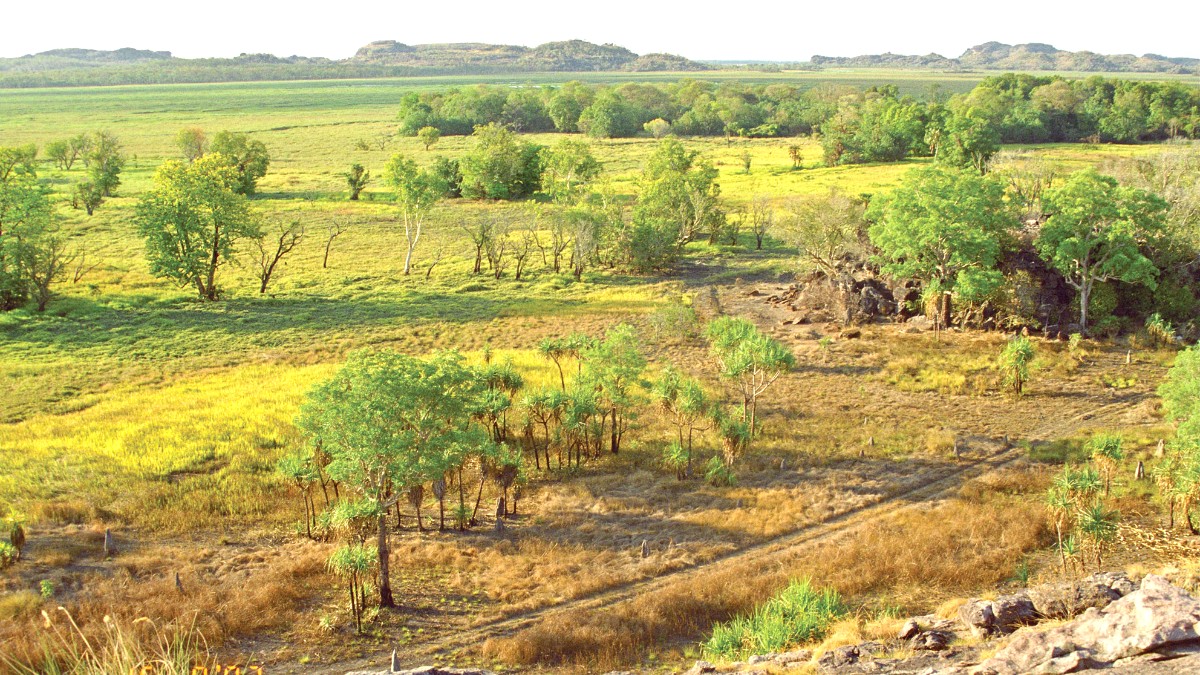
Northern Territory, Australia
Traditional Aboriginal cuisine, "bush tucker," uses native ingredients gathered from the land.
Commercial restaurants within the park do not widely feature bush tucker, but some tours or cultural experiences may offer tasting opportunities. The focus centers on fresh, local ingredients when available.
Casual dining is the norm in Kakadu.
Tipping is not customary in Australia; service charges are not added to bills, and tips are not expected.
Breakfast, lunch, and dinner operate at standard times at lodge restaurants. Cafes operate during daylight hours. Most visitors plan meals around their touring schedule.
A prized freshwater fish, often grilled or pan-fried. It has firm, white flesh and a delicate flavor.
Found at lodge restaurants like Escarpment Restaurant or Barra Bistro.
This lean red meat often appears as a steak or in a pie. It has a distinct, gamey flavor.
Occasionally featured on lodge menus.
Farmed crocodile meat is typically lean and white, often served stir-fried or as a schnitzel. It has a mild flavor.
Sometimes available at lodge restaurants.
No street food culture exists in Kakadu National Park. Dining mainly occurs within established venues or through self-catering.
The presence of fresh bush tucker ingredients is seasonal, with certain native fruits or plants available at specific times of the year.
Escarpment Restaurant at Mercure Kakadu Crocodile Hotel, Jabiru, presents a more formal dining experience. It highlights modern Australian cuisine, often with local ingredients.
Barra Bistro at Cooinda Lodge Kakadu offers a range of dishes in a relaxed setting. Mercure Kakadu Crocodile Hotel also provides more casual dining by the pool.
Very limited options. Your best budget choices are self-catering from the Jabiru supermarket or basic snacks from small cafes.
International cuisine choices remain very limited or absent.
The focus centers on Australian fare, with some dishes having international influences.
Travelers do not expect a wide range of global flavors.
Dining experiences highlight local ingredients and preparations.
No traditional markets or food halls exist within Kakadu National Park.
This means no bustling, varied food stalls common in larger cities.
Shopping for food is limited to specific outlets.
The park's event calendar focuses on nature and culture, not food festivals.
Availability remains limited. Clearly communicating dietary restrictions in advance when booking at lodge restaurants is a good practice.
Cross-contamination risk may show higher levels in small kitchens.
Bring your own safe snacks and staples.
Contact the lodges directly well in advance to inquire about their capacity to cater to specific needs.
Kakadu is not a destination known for its gastronomy, but it offers unique culinary experiences tied to its natural and cultural environment.
No dedicated cooking classes available within Kakadu National Park.
Not applicable in Kakadu.
No regular food festivals occur in Kakadu.
For specific dietary needs or preferences, bringing your own snacks and staples from Darwin supports your trip.
This fills any gaps in local availability.
Contact lodges or tour operators ahead of time for any dietary restrictions.
This allows them to better plan for your needs.
Kakadu's remote location guides its culinary scene, with fewer options compared to urban areas.
Self-catering options are a practical and economical choice for many visitors.
The dining experience centers on authentic Australian fare, occasionally featuring local bush tucker.
Consider packing a cooler with your own favorite snacks and drinks from Darwin, especially if you plan extended drives or visits to remote sites.